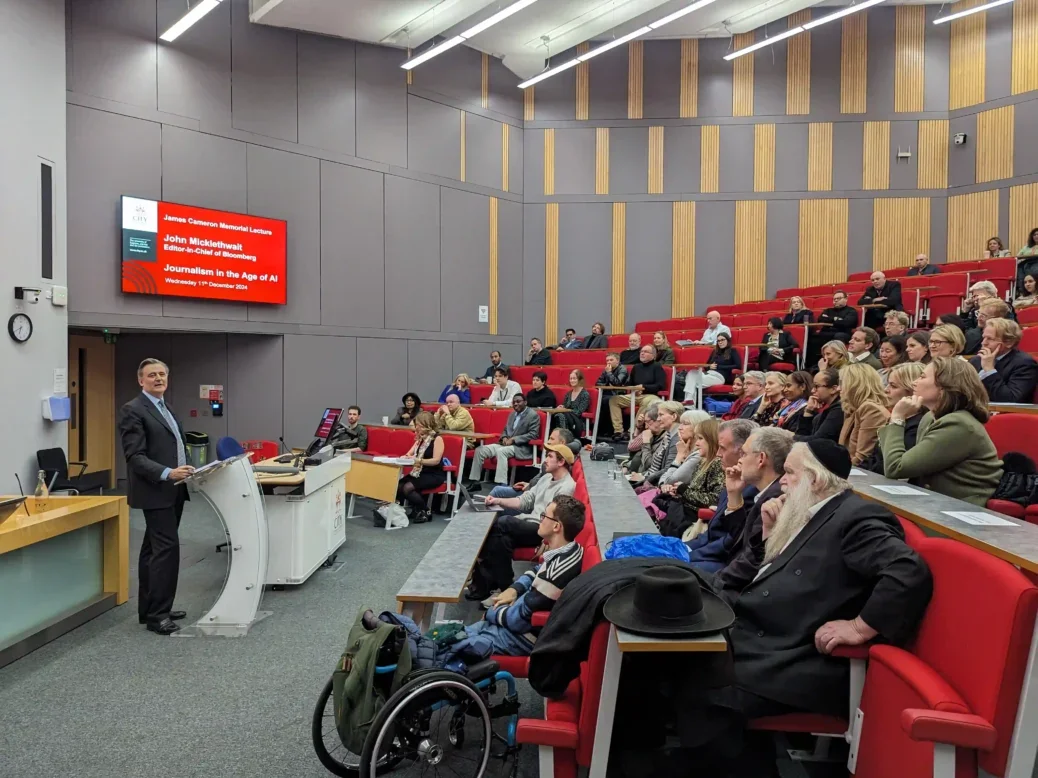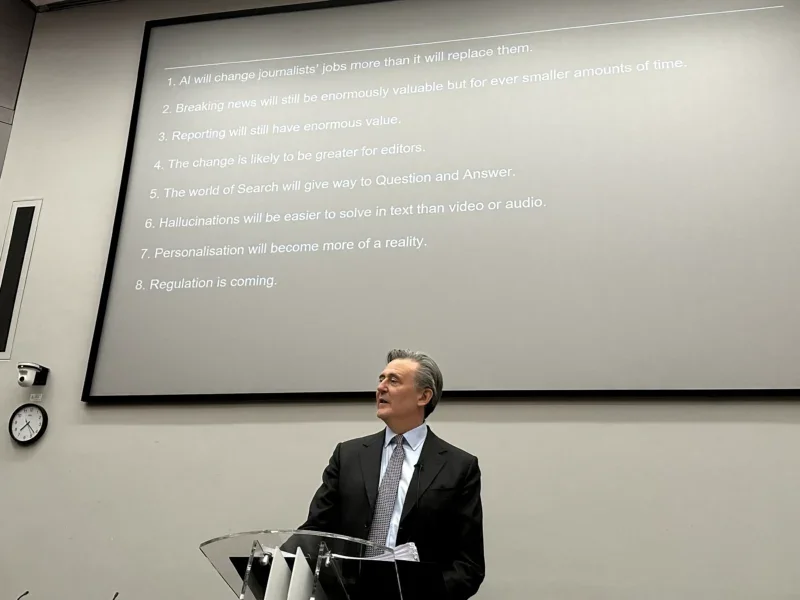
Bloomberg editor-in-chief John Micklethwait has called paywalls “the safest way to guarantee journalistic jobs” in a speech about the future of journalism.
Giving the annual James Cameron Memorial Lecture at City University, the former Economist editor predicted artificial intelligence would do more to change editing than it will reporting.
He also used the talk to criticise the Supreme Court’s 2022 Bloomberg vs ZXC ruling that prevents newsrooms from identifying arrested persons before they are charged, saying it will stop “the sort of reporting that brought down Robert Maxwell”.
Micklethwait said he now felt “the quality press, with a few exceptions, is actually doing rather well” — after a “prolonged period of self-harm” during which “people in our industry kept on giving away good content for free”.
He said there were two major reasons to adopt paywalls.
“The first is that paywalls really are the safest way to guarantee journalistic jobs. There are lots of reasons why The Economist has overtaken other weekly magazines, but one is that it always asks people to pay.
“As for Bloomberg, a rival editor here used to complain to me that we were the Man City of journalism, back when that was a compliment. That was only because we had the Bloomberg Terminal behind us — the ultimate paywall. [Now] add in our new consumer paywall offering — around a million people around the world pay for our content.”
Bloomberg Media, the company’s consumer offering, said in October it hit 740,000 paying subscribers, representing a nearly 50% growth in a year. Bloomberg Terminal subscribers make up the balance of the million total.
The second reason, he said, was “to do with independence”.
“Some of the harder ethical decisions you face as an editor involve sponsors and advertisers. Are you happy taking money from this government entity? Should you let a tech conference be sponsored by a tech company? Do you want to share your brand with this partner?
“The beautiful clarity of being a subscription-led business is that most decisions only need to answer one question: ‘Will this make consumers more or less likely to pay for our content?’
“And usually, when it comes to taking the wrong sort of sponsorship, the answer is less.”
AI summarisation lets audience ‘read more of our content’
In common with other financial publications and agencies, Bloomberg integrated some automation into its workflow long before ChatGPT achieved its current level of fame. Micklethwait said that of the 5,000 or so stories Bloomberg publishes daily, more than a third use some form of automation.
“We have computers that scour social media looking for keywords — some of them grizzly ones — to alert us to news. They also use market data to prompt us to consider writing a story, for instance, telling a pharmaceutical reporter that GSK’s share price has fallen 10% faster than other drug makers — what’s the reason, do you want to write about it?”
More recently Bloomberg has deployed AI-written, bullet point article summaries at the top of its stories, and Micklethwait said “customers like it. They can quickly see what the story is about”.
The journalists, on the other hand, “are much more suspicious” because they “worry that people will read the summary rather than their story.
“To which the honest answer is: yes, a reader might well do that.
“But would you prefer that they wasted their time skimming through paragraphs they didn’t want to read? Somebody who saves time can read more pieces, more of our content.
“To me, it’s pretty clear these summaries, used correctly, both help our readers and save time for editors.”
But even though Bloomberg readers “hate it when we waste their time”, Micklethwait made the case that, “if you want to get up to speed on, for instance, how Britain will cope with Trump’s threat of a trade war, would you rather read a lot of headlines and see some video clips, or just one long story in Businessweek or The Spectator or the FT?
“I think the long piece actually saves you time… On the commute back home or the weekend, our users want the world explained to them.”
[Read more: Swedish daily Aftonbladet finds people spend longer on articles with AI-generated summaries]
John Micklethwait’s predictions for AI and journalism

Micklethwait made eight predictions for AI and journalism:
- AI will change journalists’ jobs more than it will replace them
- Breaking news will still be enormously valuable but for ever smaller amounts of time
- Reporting will still have enormous value
- The change is likely to be greater for editors
- The world of Search will give way to Question and Answer
- Hallucinations will be easier to solve in text than video or audio
- Personalisation will become more of a reality
- Regulation is coming.
Micklethwait does not believe AI will significantly cut the number of journalists, noting that since Bloomberg began implementing automation “we still employ roughly the same number of people to look at earnings, but the number of companies whose earnings we cover and the depth of the coverage have both increased dramatically”.
A specific newsroom use of AI Micklethwait anticipated was for reformatting stories or “combining stories to make a first draft”.
“For instance, if you want to provide your readers with an explainer on the fall of Assad in Syria, you’ll be able to run four of your current stories through an algorithm. In seconds you will have a crude first draft of an explainer that the journalists can then work on.”
Breaking news, he said, would “still be enormously valuable”, something demonstrated by the way that “every time we break news, the price of something, somewhere, probably moves”.
Micklethwait estimated that in his time at Bloomberg, the time it takes prices to move after an unexpected news story goes live “has gone down from around ten seconds to perhaps five”. AI he said, “is only going to speed that process up”.
But similarly he said that original reporting would remain key: “The machine can’t persuade a cabinet minister to tell you that the chancellor has just resigned. It can’t take a chief executive for lunch.”
Editing, on the other hand, would be more likely to change, with AI capable of checking the spelling, house style and basic facts of a story before a human begins their in-depth edit.
‘Search as we know it likely to disappear’
And Micklethwait said “search as we know it, I think, is likely to disappear” amid a shift to natural language, AI-answered search engines.
“This is another reason why we need to hang on to our content… When publishers have done deals with the likes of OpenAI, they’ve been for limited time periods and for decent amounts of cash. Plainly, this time, nobody wants to give away the shop for nothing.”
But he said he wanted “much more clarity” from the courts and Parliament around “what can and can’t be used free of charge”.
Bloomberg has not inked a deal with any of the generative AI companies. Asked by Press Gazette whether he felt those sort of deals could be viable long-term as a way to help fund journalism, Micklethwait said “I think they could be”.
“A lot depends on the law and what happens to that. But I do, in the end, expect there will be longer-term deals.”
He said he was optimistic, over the long term, that the proliferation of low-quality information in the age of AI would not last forever.
Micklethwait likened the ubiquity of AI-created misinformation to the 19th century popularity of The New York Sun, a prominent penny daily tabloid which once famously reported that astronomers had discovered civilisation on the Moon (and is today owned by Daily Telegraph bidder Dovid Efune).
Despite the paper’s early success, Micklethwait said, “things began to sort themselves out. New Yorkers preferred to pay for news that was useful, that told them things about the real world, and the new consumer goods companies preferred to advertise their wares alongside stories that were actually true”.
He said he hoped “that this time, our industry is better prepared for technology — this time, the flight to quality will be quicker”.
John Micklethwait likens social media companies to the tobacco industry
Micklethwait said he had “a hunch” that AI would “begin to crack this puzzle” of personalisation and the news, which he described as “the holy grail of journalism for most of my career”. But he said there was a “dark side” to this benefit, citing “the addictiveness” of social media recommendation algorithms.
“At the moment, social media companies are not liable for the content on their networks in the same way that an editor like me would be. Thanks to rules like the infamous Section 230, the tech giants are treated as if they are more like telephone companies than media companies. They’re just responsible for the wires, not what is said on them.
“Speaking personally, I think that argument is already pretty threadbare, and it will become ever more so the more powerful AI becomes. What happens when teenagers start falling in love with people who turn out to be AI creations?
“Tobacco companies tried the argument that it was not their product that killed people — smoking was a matter of personal choice. But eventually that wall crumbled. I think eventually the tech giants will lose that battle too, not least because anybody with children can talk about the addictiveness of their product.”
Bloomberg editor says ZXC case prevents ‘the sort of reporting that brought down Robert Maxwell’
Micklethwait also used his lecture to criticise the Supreme Court’s 2022 decision in Bloomberg LP vs ZXC, in which judges ruled that a person cannot be named by the media before they are charged.
He said: “In 2022 in the so-called ZXC case, Britain’s Supreme Court ruled that Bloomberg had erred in revealing a criminal investigation into a former executive of a prominent multinational.
“They rejected it not on the grounds of libel — everyone agreed that the story was accurate — but on the grounds of privacy.
“That Supreme Court ruling, which would have ruled out, I would argue, the sort of reporting that brought down Robert Maxwell, is now sadly cited by pretty much every liar trying to protect a dodgy client.”
The ZXC case has set a significant precedent for newsrooms. It was cited in legal threats sent to publishers by lawyers acting for Dan Wootton earlier this year and was used by businessman Javad Marandi to argue he should not be named as a “person of importance” in proceedings linked to the BBC’s 2017 “Azerbaijani Laundromat” investigation. (Marandi denies any wrongdoing.)
A high-profile man who was the subject of an injuncted BBC investigation also could not be named in February because, while he had been arrested twice, he had not been charged.
But Micklethwait added that he thought “one reason why governments can get away with doing these things to journalists is because people don’t seem to like us very much.
“Bloomberg may have lost the ZXC case, but the real culprit, I would argue, was years of tabloid intrusion into normal people’s lives, typified by the phone-hacking scandal and the monstrous broadcasting of a police raid on Cliff Richard’s home.
“Even if editors might publicly bridle at Donald Trump describing what they do as ‘fake news’, it’s hard to argue with the idea that many big American newsrooms did not understand or do not understand the conservative part of their country.”
Email pged@pressgazette.co.uk to point out mistakes, provide story tips or send in a letter for publication on our "Letters Page" blog

